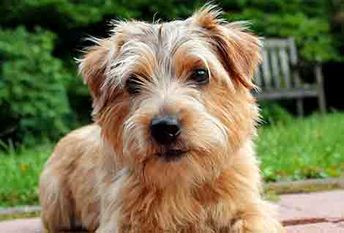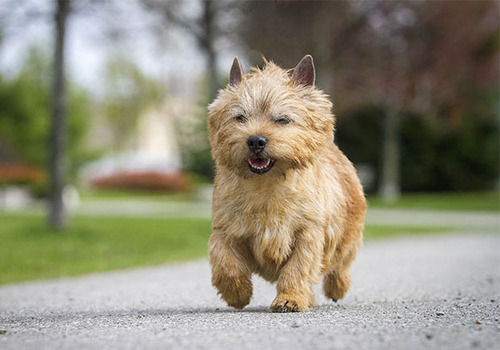The Norwich Terrier has hard, wiry, straight coat with a heavier amount on the neck and shoulders forming a protective mane. Trimming isn’t necessary, but the coat does need to be hand-stripped twice a year, a time-consuming process of pulling out loose hair with a tool called a stripping knife. Between strippings, you should brush the dog’s coat weekly.
If you choose not to strip the coat but only brush it, Norwich will have a scruffy appearance, which some people like. The drawback to this is that the coat will shed more, especially as the dog matures. Stripping the coat has other benefits as well. A stripped coat sheds dirt and is water resistant. Terriers whose coats are stripped need fewer baths.
For a neater look, you can have your Norwich clipped by a professional groomer, but it’s not the perfect solution. When you cut a Norwich’s hair, it lightens the color because part of the pigment is removed, and it softens the texture, making the coat less protective.
The rest is basic care. The ears should be checked on a regular basis for signs of wax buildup, irritation or infection. Clean them with a cotton ball and a veterinarian-approved cleanser; never use a cotton swab in a dog's ear canal. Teeth should be brushed on a weekly basis to prevent tartar buildup, promote gum health and keep bad breath at bay. Trim the Norwich Terrier's nails monthly if the dog does not wear the toenails down naturally outdoors.
The Norwich retains its original hunting instincts and jovial temperament. They are inquisitive and energetic, and they should be in a fit condition for the day’s activities. They require ampleexerciseto benefit their mental and physical health. Because of their innate hunting instincts, they must be walked on a leash or let out only in a securely fenced area.
With this said, Norwich Terrier puppies should not be given too much exercise because their joints and bones are still growing and too much pressure on them could result in causing a dog a few problems later on in their lives. They should not be allowed to jump up or off furniture nor should they be allowed to run up and down the stairs because this puts too much pressure on their still growing joints and limbs.
If you get a Norwich Terrier puppy from a breeder, they would give you a feeding schedule and it's important to stick to the same routine, feeding the same puppy food to avoid any tummy upsets. You can change a puppy's diet, but this needs to be done very gradually always making sure they don't develop any digestive upsets and if they do, it's best to put them back on their original diet and to discuss things with the vet before attempting to change it again.
Older dogs are not known to be fussy or finicky eaters, but this does not mean you can feed them a lower quality diet. It's best to feed a mature dog twice a day, once in the morning and then again in the evening, making sure it's good quality food that meets all their nutritional requirements.
Treatscan be an important aid in training, but giving too many can cause obesity. Learn about whichhuman foodsare safe for dogs, and which are not. Check with your vet if you have any concerns about your dog’s weight or diet.Clean, fresh water should be available at all times.
The average life span of the Norwich Terrier is 12 to 15 years. Norwich Terriers are a healthy breed.Responsible breedersscreen their stock for health conditions such aship dysplasia, epilepsy, degenerative myelopathy, and upper airway syndrome, a respiratory condition that is quite variable, and its prevalence and mode of inheritance are poorly understood. Norwich are prone to developing plaque and tartar, so diligent dentalcareis essential.
Intelligent and willful – it’s a combination that makes the Norwich Terrier a somewhat challenging dog to train. In order to be successful, you must be patient to overcome this dog’s willfulness as well as make training sessions fun and exciting for your pooch. You’ll find that Norwich Terriers respond best to positive reinforcement training methods. If you use negative training methods, you won’t get far with the Norwich, thanks to its willful nature. Since your Norwich will be spending a lot of time on its leash, you’ll need to start proper leash training early.
Puppies should be properlysocializedto develop the amiable, outgoing personality that is characteristic of the breed. They’re successful in performance and companion events such as earthdog,barn hunt,obedience, andagility.












